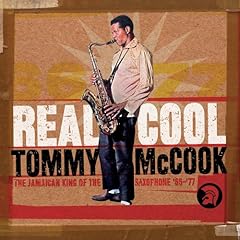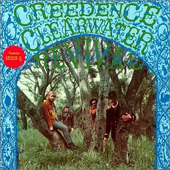
Tommy McCook
Real Cool: The Jamaican King of The Saxophone '66-'77
Sanctuary Trojan US
2005 (Compilation Release) 1966-1977 (Original Releases)
Originally, I was unsure if a compilation such as this was appropriate for our discussion here at The Red Skull, even if the re-release did barely squeezed into our 2 years-and-older window. Conferring with my erstwhile co-blogger confirmed that it was a fit, so I'm gladly reviewing it here. Still, a little discussion on this point is in order.
It is this critic's opinion that the album itself is an art form. When arranged properly, the album is more than a collection of songs, but an artistic statement itself. Adding in the (often) ignored details of cover art and packaging reinforces this notion. This was the source of the trepidation on my part about the inclusion of a compilation. Interestingly, this was most true for a certain period of time. In the 50's and 60's, it was much more common for artists to release singles and EP's. Full length albums weren't the commodity they became in later years. In the present day, we seem to be returning to that mentality with the migration from physical to digital media. If an artist has recorded a great new song, why go through the process of recording filler for a full-length album when iTunes is just a click away?
For now, however, releasing full-length albums is still quite fashionable, much to my delight. In the case of Tommy McCook's golden age in Jamaica, however, that wasn't the case. Real Cool is a collection of the many singles, 7"s, and EPs he released for the legendary Trojan Records label. Compilations like this are a great boon for those like me who were born after these releases and didn't discover them for many years.
This massive (49 tracks!) two disc set contains the definitive solo work of McCook's best years as a pioneer of Ska, Dub, and Reggae. Additionally, it contains fantastic collaborations with other giants of the era. Bobby Ellis, Ron Wilson, The Aggrovators, The Supersonics, Lester Sterling, Lloyd Knibb, Lyn Taitt and others make appearances here. It is a fantastic collection of the the best years of Jamaican music. McCook shows himself to be an excellent band leader and soloist on his own compositions as well as those by Bunny Lee, Lester Sterling, and even Oscar Hammerstein. Through it all, McCook shows comfort and innovation all different kinds of musical styles. This is fantastic as in introduction to McCook's vast catalog, or as a source of some hard to find gems.







